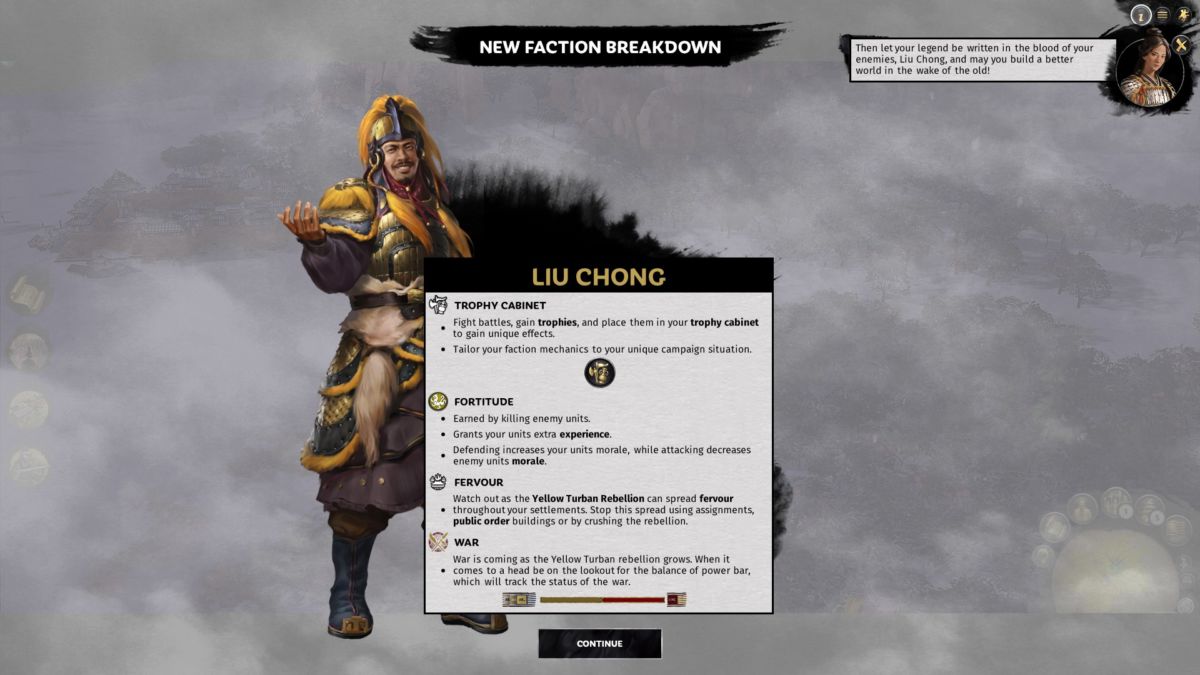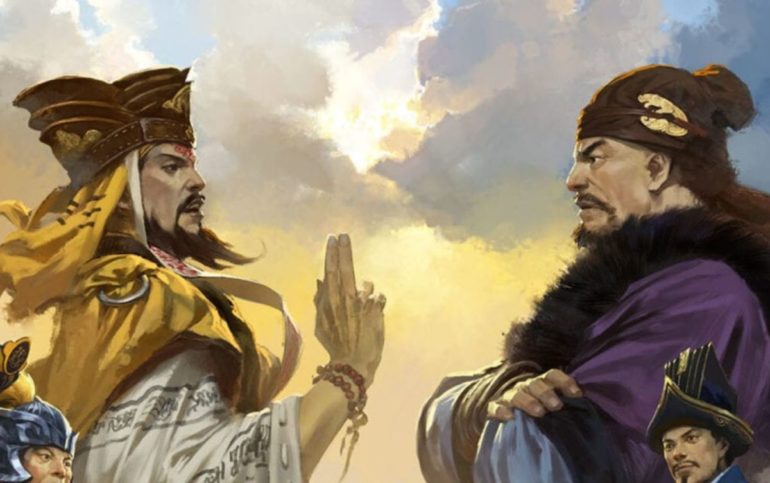Mandate of Heaven is the latest expansion to last year’s best strategy game, Total War: Three Kingdoms. Set in the year 182 CE, eight years before the main game’s campaign, Mandate of Heaven deals with the rise of the Yellow Turbans and the subsequent fall of the Han dynasty.
The new timeline means that we have access to some additional units and the map itself is quite different from what we are used to. For example, the tech level is lower than before — places that were cities in Three Kingdoms are mere towns now and it takes a bit longer for you to field some of the stronger units in the game. On the other hand, some factions can instantly deploy incredibly strong (though expensive) units, like Liu Chong’s Chen Royal Guards and Chen Peacekeepers. You also have access to some new factions to play around with, including the Han empire itself and the instigators of the Yellow Turban rebellion.
Much like in the base game, the factions are not all that different from each other, rather they each have some special mechanic and a handful of unique units that will hint at how they are best played. For instance, Liu Chong displays trophies from fallen enemies and receives buffs from war fervor. This lets you know that this is an aggressive, lead from the front lines kind of guy. The unique units he has at his disposal are mixed ranged and melee types that can switch in accordance with the situation.

The earlier start date of Mandate of Heaven also means that the factions and their relations are quite a lot different from how they were in the original campaign. While that campaign focused on the power vacuum that occurred once the empire had crumbled and old alliances had broken down, Mandate of Heaven puts you in a scenario where most allegiances are already determined at the start. Most factions belong to either the Han empire or the Yellow Turbans for the first couple of turns, before things start to break down. This means that there is a lot less chaos in the early stages of the game. Most imperial factions get along nicely and are friendly towards one another. As the rebellion continues, however, the old power structure starts to crumble and more and more factions turn their backs on the empire.
The most interesting thing in how Mandate of Heaven’s campaign is structured is that you can start out being more or less boxed in by allies. Total War games usually start by giving you a few hostile territories around you to snap up. In contrast, Mandate of Heaven will have you making deals for military access to allied territory, using this to project power far away from your borders. This is something you almost never have to deal with in other Total War games where you more or less just expand your borders until you are the biggest and baddest faction around.
This shift in focus also means that you have some strategical conundrums to consider. As you move your armies to faraway lands to crush the rebellion, you leave your homelands much less defended. This makes fending off local rebels and other enemies that much harder to deal with. By doing this, Mandate of Heaven finally makes it a bit more attractive to sack, loot and move on from settlements instead of occupying them and their lands. Additionally, it makes territory trade as a diplomatic option that much more viable. If you conquer a bunch of lands far away from your borders, an ally might be willing to trade them with you for something that is closer to home and easier to defend. While this has been possible in most Total War games, this is the first time I have felt that the campaign actually manages to create situations where this makes sense to engage with and have an AI which is savvy enough to make such deals.

Another thing that is good fun in the campaign is that it lets you try to alter the course of history. Many factions from Three Kingdoms are still in Mandate of Heaven, though at different levels of power and influence. You can now experience Cao Cao’s rise to prominence, or Dong Zhou’s fall into tyranny and barbarism. It also lets you play around with major characters and events. What if Lui Bei went and murdered Dong Zhou dead well before he could usurp the throne? Or what if Cao Cao formed a coalition with the northern bandits in order to throw a million men at Lu Bu before he becomes even more impossible to kill than he already is?
That said, Mandate of Heaven isn’t a huge expansion. It doesn’t remake the game or change its style or era completely like some other Total War expansions have done. Expansions like Age of Charlemange and Fall of the Samurai or Caesar in Gaul, to name a few, were more or less stand-alone mini Total Wars in their own right. Mandate of Heaven and Three Kingdom’s approach so far is much more in line with the faction DLCs for the Warhammer flavor of Total War, or something similar to what Paradox Interactive does in their grand strategy games. It augments and improves what is already there and highlights things about the mechanics which might not have been as fleshed out before rather than trying to make something bigger and completely new.
It will be interesting to see where this path takes Creative Assembly and the Total War games as a whole. Coinciding with the new expansion is also a larger title update to the game which puts the different scenarios and DLCs on a timeline as you start a new game. In the timeline, there are plenty of gaps and you can easily imagine where one might drop in some additional expansions down the line. Again, this is very reminiscent of how Paradox tends to handle its own DLCs. When Three Kingdoms first came out last year, I was convinced we would get a Mongol invasion type of expansion or something to do with Japan or Korea. Now I am not so sure. Maybe the days of big ‘total conversion’ type expansions for Total War games are a thing of the past and we will have to make do with these smaller additions that eventually make a bigger whole. Whatever they end up doing, I hope they don’t drink too deep from the Paradox cup, where you end up spending hundreds of dollars to get the complete game experience, several years after the initial release.
For now, though, Mandate of Heaven is great fun and for people who already enjoyed the excellent gameplay in Three Kingdoms, this is a must buy. The alternate history aspects alone are well worth the price of admission.
Some of the coverage you find on Cultured Vultures contains affiliate links, which provide us with small commissions based on purchases made from visiting our site. We cover gaming news, movie reviews, wrestling and much more.



